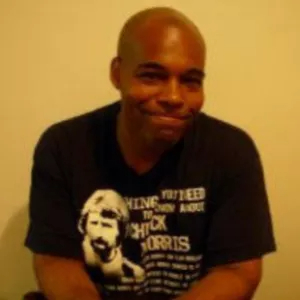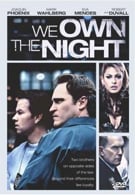We Own the Night is a good film—a very good film, actually—that was made at the wrong time and in the wrong year. Coming off of the smoky bravado of Scorsese’s epic crime drama, The Departed, We Own the Night didn’t look star studded enough in the trailers, even though it features one Academy Award winner and two nominees (with Robert Duvall, Joaquin Phoenix, and Mark Wahlberg respectively) to be a major contender in the box office. It’s little wonder that it failed to generate much interest, but let me tell you, as one who merely “liked” The Departed, I have to say I think We Own the Night has a little bit more going for it than 2006’s big winner; a little something more called depth. Joaquin Phoenix stars as Bobby Green, a Brooklyn nightclub owner who deals with some seedy characters and also happens to be the son and brother of two of New York’s finest. Bobby could care less what his brother (Wahlberg) or father (Duvall) think of him, as all he cares about is rising to success and the many wet kisses as his girlfriend, played by a surprisingly not-as-annoying-as-she-usually-is, Eva Mendes, can give to him.
But the shit hits the fan when a notorious drug lord takes up stable in Bobby’s club and starts making the kind of deals that make the police curious and raid happy. Of course, the cops go to Bobby to make the right decision and to cooperate and tell them if he knows anything about what’s going on in his club, but Bobby turns a blind eye and gives a verbal tirade equivalent of the middle finger to the fuzz, which includes his father and his brother. This then leads us to believe that something terrible is going to happen, as nobody can be that evil to the good guys in a movie without getting their comeuppance in the end.
What follows is a surprising turn of events that leads to role reversals, but not to the almost comical extent that The Departed does, and that’s why I think I really enjoyed this movie more. Informant movies are nothing new in cinema, but Joaquin Phoenix, brilliant in everything he does, adds a certain gravitas, even if his shift in character near the third act of the film seems a little hokey and predictable.
I know I shouldn’t keep comparing The Departed to this movie, but I think it’s unavoidable since the two share so much in common but vary in so many different ways. First is the Martin Sheen character in The Departed, which adds yet another guffaw to the already laughably comical story. Robert Duvall as the police chief in We Own the Night doesn’t use his acting chops for stressing a phony Boston accent. Instead, he’s mired in his own distressed furrowed brow, which really displays a man torn between hating his crime abetting son, and loving him just because he’s blood.
Then there’s the turning point in the respective films. We actually feel a hint of sadness for what eventually turns Bobby good, but the same doesn’t apply for what turns Leonardo DiCaprio nuts when he witnesses the police captain go hurdling from the rooftop. Other than a cringe inducing groan from seeing Sheen get splattered on the pavement, the emotion isn’t there. It’s just another bit of blood in an already bloody film.
Finally there’s the ending, which is always a direct way to spot if the movie succeeds or not. Marky Mark’s turn as a brash Boston cop out for justice in The Departed pales in comparison with how strong his acting is in the end of We Own the Night, and the morose, dry climax adds almost a Sopranos-esque appeal to it, as it ends with more of a whimper than any ear shattering bang.
Overall, if you’re looking for a sorely overlooked movie, you’d be doing yourself a disservice to not give We Own the Night a try. If you don't think director, James Gray, is much of a genius after watching his thick-with-layers movie, then you definitely will think he is after listening to his overly insightful commentary. Sounding like one of my old college professors, Gray dissects his movie with pinpoint analysis and even goes the length to say that he wanted to make it into sort of a Greek tragedy mixed with a little Shakespeare, saying that Joaquin’s character was supposed to be reminiscent of Prince Hal in Henry IV. He also explains how he tries to cloud up the notion of what a cop drama can be, citing how the long, wordy parts were what excited him as a director, and how the action packed, rainy car chases and shoot-outs are what he found to be a complete bore when he filmed them, showing that cop dramas can be as deep and wrought with symbolism as any David Lynch movie.
Your Daily Blend of Entertainment News
As good as the commentary is, though, the rest of the features pretty much act as filler and recapitulate everything that the director had to espouse in his commentary. “Tension: Creating We Are the Night” is a lame featurette that explains how Gray got the idea for the movie by seeing a picture in The New York Times, and it also features the actors in the film beefing up the director’s reputation, as even Mark Wahlberg goes the extent to call the movie, “Shakespearean.” “Police Action: Filming Cops, Cars, and Chaos,” shows how some of the awesome action sequences happened, but it's sullied by the droning of the director when he talks about how much he hated filming them. “A Moment in Crime: Creating Late 80s Brooklyn,” merely reiterates the fact that this is actually a period piece (the period being 1989), and not taking place in modern times. As if I couldn’t tell by the garish clothing.
Previews are also featured on the disc, but when they include crap like Revolver and Southland Tales, do they really even matter? Great movie, but only okay special features for this DVD release.

Rich is a Jersey boy, through and through. He graduated from Rutgers University (Go, R.U.!), and thinks the Garden State is the best state in the country. That said, he’ll take Chicago Deep Dish pizza over a New York slice any day of the week. Don’t hate. When he’s not watching his two kids, he’s usually working on a novel, watching vintage movies, or reading some obscure book.

